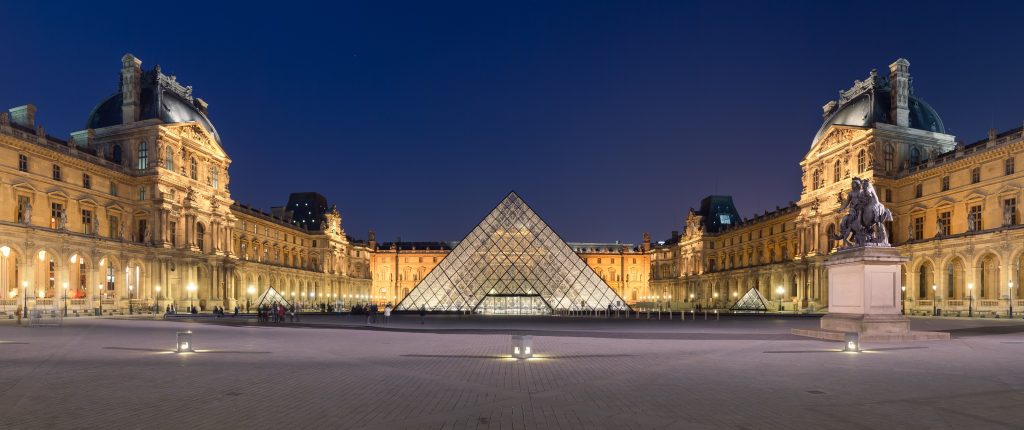French Architecture – The Louvre Pyramid Posted by Tim Hildreth on Aug 6, 2019 in Culture, Vocabulary
In previous posts, I’ve alluded to the fact that not everyone was originally happy about plans to build a giant glass-and-steel pyramid in the heart of one of Paris’s most treasured buildings. This week we look at a historical document that illustrates the different opinions of the time.

Des Racines et des Ailes / Of roots and of wings
Des Racines et des Ailes is a wonderful French television documentary program highlighting different parts of France and French culture in the world. Their extensive collection of YouTube videos is a great resource for practicing your French listening comprehension skills while learning! The video below highlights the variety of opinions around the building of the Louvre Pyramid, which began in 1985. It includes a number of headlines from des journaux français (French newspapers) and from French people.
| Français | English |
| Louvre: la bataille de la pyramide | Louvre : the battle of the pyramid |
| Sus à la pyramide! | Enough with / Down with the pyramid! |
| Mitterrand* veut “sa” pyramide | Mitterand wants “his” pyramid |
| La pyramide de la discorde | The pyramid of conflict |
* François Mitterrand was the longest-serving French president. In office from 1981 – 1995, he left his mark on the county, and on Paris with not just the Louvre Pyramid but an ambitious library project.
Jacques Chirac (future president of France and Maire de Paris à l’époque / Mayor of Paris at the time) had an interesting idea. He requested that a life-size model be erected at the site so that les Parisiens pouvaient se faire une opinion du projet (so that the Parisians could get an idea of the project). Et qu’en avaient-ils pensé? (And what did they think?)
| Français | English |
| Première femme : Ça ne me plait pas, d’abord pourquoi une pyramide ? Ça me fait penser à l’Egypte. Ensuite dans un cadre aussi magnifique … Tout l’argent qu’on a investi là-dedans, on aurait mieux fait de restaurer le palais. Ça aurait été plus intéressant. C’est dommage. Je trouve que c’est dommage, c’est tout. | First woman : I don’t like it (lit. It does not please me), first why a pyramid? It makes me think of Egypt. And in such a magnificent setting … All the money they’re investing in it would have been better spent on restoring the palace. That would have been more interesting. It’s too bad. I find it a shame, that’s all. |
| Reporteur : Elle ne vous gêne pas dans le site ? | Reporter : It doesn’t bother you on the site? |
| Deuxième femme : Non pas du tout. Je trouve que c’est beaucoup plus dégagé que quand il y avait ce petit square au milieu de la cour. | Second woman : No, not at all. I find it much more open than when they had that little square in the middle of the courtyard. |
| Homme : On ne mélange pas du dix-septième du dix-huitième … | Man : You don’t mix the 17th, 18th (centuries) … |
| Troisième femme : Et puis il y a des architectes français qui ont certainement des idées. On n’a pas besoin de demander ça à un Chinois. Deuxièmement … troisièmement si on a besoin de faire des boutiques en sous-sol, on a qu’à les faire en sous-sol. On n’a pas besoin de démolir le patrimoine français. | Third woman : And there are French architects who surely have ideas. We didn’t need to go ask a Chinese (one) Second … third if you need to build stores, just build them in the underground area. There was no need to demolish the French patrimony. |
| Deuxième homme : Bah les antis, les vieux, les jeunes, il faut être de son époque aussi. | Second man : Oh, those against, the old, the young, you have to adapt to the times too. |
Photo by Benh LIEU SONG (Own work) [CC BY-SA 3.0 (http://creativecommons.org/licenses/by-sa/3.0)], via Wikimedia Commons

Build vocabulary, practice pronunciation, and more with Transparent Language Online. Available anytime, anywhere, on any device.



